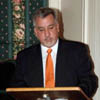 Thank you for participating in the 2011 We the People: The Citizen and the Constitution National Finals! Dear Judges and Volunteers: On behalf of the Center for Civic Education, I want to personally thank you for participating in the 2011 We the People: The Citizen and the Constitution National Finals. Your dedication to the We the People program will ensure a quality experience for the students and teachers participating in the national finals. A packet will be available for you with more information at the We the People information desk outside the Grand Ballroom on Friday evening and in the lobby on Saturday and Sunday. 
Robert S. Leming, Director Judges > Learn More Timers > Learn More Facilitators > Learn More Room Supervisors > Learn More Floor Supervisors > Learn More Scorers > Learn More Volunteer Schedule Friday, April 29—Arrivals (all day)
Crystal Gateway Marriott4:15 pm–4:45 p.m. Facilitators’ Orientation 5:00 pm–7:00 p.m. Judges’ and Facilitators’ Orientation 6:00 pm–7:00 p.m. Timers’ and Room Supervisors’ Orientation 7:00 pm–8:00 p.m. Welcome and Networking Meeting for Orientation Participants See the Event Schedule for a full listing of all national finals events. Judges' Resources Judges' Orientation Video Whether this is your first time judging at the national finals or you have participated in the past, please review the resources listed below. To a large extent the quality of the competition is based upon the expertise and demeanor of the judges. The We the People program allows for variations in implementation at the congressional district and state levels to suit local needs. Procedures may differ slightly in congressional district, regional, and state competitions from those followed at the national finals. Seventy-two judges will participate in the competition on Saturday and Sunday. Eighteen judges will participate on Monday. Timers' Resources Timers' Video Participating as a timer at the national finals is an important job. Please watch the Timers' Video to help prepare you for the national finals. All hearings on Saturday and Sunday are ten minutes long (four minutes for the opening statement and six minutes for follow-up questions). On Monday the hearings are extended to fifteen minutes (four minutes for the opening statement and eleven minutes for follow-up questions). Facilitators A facilitator's primary responsibility is to escort in a timely fashion a panel of judges to the hearing rooms. Once in a hearing room facilitators will officially welcome everyone. Facilitators are also responsible for distributing score sheets to the judges and collecting them after the hearings. Room Supervisors A room supervisor's primary responsibility is to monitor hearing rooms and to greet teachers, students, visitors, and judges. During the competition, room supervisors control access to the hearing rooms. Floor Supervisors Floor supervisors are responsible for greeting classes upon arrival at the competition. They are also responsible for directing classes, parents, visitors, and other guests to the student briefing room and the hearing rooms. After the compeletion of class hearings, the floor supervisors help direct classes to their buses. They also inspect the hearing rooms to make sure they are ready for the next division of classes. Floor supervisors are always ready to handle any problems that may arise. Scorers Scorers are responsible for tabulating the judges' score sheets for each of the fifty-two classes. The scoring team includes six volunteers. Scoring works like this: six different panels of three judges score each of the six units for a total of eighteen judges' score sheets. Each class testifies on one question on Saturday and testifies again on a different question on Sunday (3 judge panels x 6 units x 2 days = 36 score sheets). Each score sheet includes six criteria, and each criterion is worth ten points. The highest possible score for each score sheet is 60 points. Each unit is judged by three judges; therefore, the highest possible unit score is 180 points. Because there are six units, the highest possible class score is 1,080 points. Because classes testify on two days, the highest possible total class score is 2,160 points. Classes qualify for the top ten by earning combined scores from the first two days of competition. The national winner is determined by doubling the third-day scores and adding them to the total scores for the first two days. The highest score possible for the national finals is 4,320 points. |
About
 This site is brought to you by the Center for Civic Education. The Center's mission is to promote an enlightened and responsible citizenry committed to democratic principles and actively engaged in the practice of democracy. The Center has reached more than 30 million students and their teachers since 1965. Learn more.
This site is brought to you by the Center for Civic Education. The Center's mission is to promote an enlightened and responsible citizenry committed to democratic principles and actively engaged in the practice of democracy. The Center has reached more than 30 million students and their teachers since 1965. Learn more.
Center for Civic Education
5115 Douglas Fir Road, Suite J
Calabasas, CA 91302
Phone: (818) 591-9321
Email: web@civiced.org
Media Inquiries: cce@civiced.org
Website: www.civiced.org




